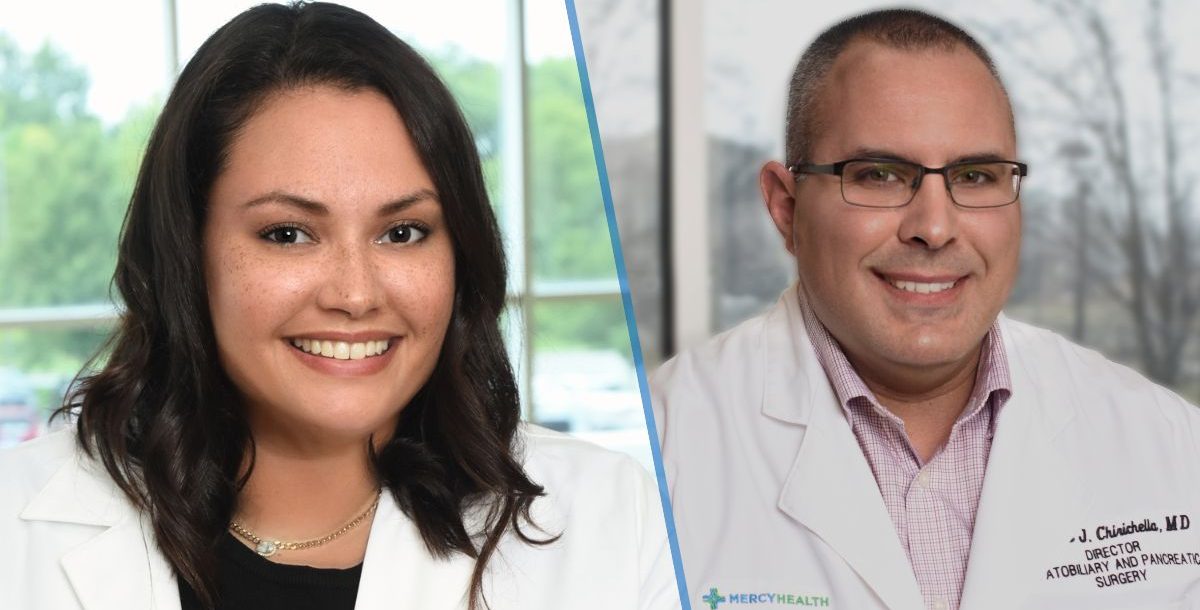If you watch “Grey’s Anatomy” or other medical television dramas, chances are you’ve heard the term “Whipple” before. But what is a Whipple procedure?
A Whipple is a complex surgery used to treat pancreatic cancer, tumors and other conditions affecting the pancreas, small intestine and bile ducts. The Whipple procedure, also called a pancreaticoduodenectomy formerly, is a surgery to remove the head of the pancreas, the first part of the small intestine, the gallbladder, the bile duct and any corresponding lymph nodes.
Frances McCarron, MD, (pictured above, left), a hepatobiliary surgeon in our Youngstown market, recently made history by performing the Mahoning Valley’s first robotic Whipple surgery. Now, she’s answering some of the most common questions asked about Whipple surgeries.
Why would someone need a Whipple procedure?
“For those needing treatment for pancreatic cancer, a Whipple procedure is often the primary surgical option. However, the procedure can also be used to treat pancreatic cysts, tumors, pancreatitis, bile duct and small bowel cancers, or when the pancreas or small intestine experiences trauma.”
What is the life expectancy after this procedure?
“The five-year survival rate for pancreatic cancer patients following a Whipple procedure is 20 to 25 percent. It is also the only potential cure for cancers in the head of the pancreas. Patients with other conditions that are non-cancerous may have a normal life expectancy following the operation.”
What happens in a Whipple procedure?
“During a Whipple, a surgeon will remove the head of the pancreas, portions of the small intestine and stomach, gallbladder, bile duct and surrounding lymph nodes. Ultimately, the procedure involves removing portions of the gastrointestinal tract, or digestive system, and reconstructing it by reconnecting what’s left of the pancreas, bile duct and stomach to the intestines.”
How is the Whipple procedure performed?
“The Whipple operation is a very complex open surgery that is often performed through a large incision in the abdomen. In fact, this is how it is performed throughout most of the world. However, some hepatobiliary surgeons perform the procedure as minimally invasive, which allows for smaller incisions, less of a stay in the hospital and reduced recovery time.
The robotic Whipple is the same complex operation, performed minimally invasive, or through small incisions. It’s significant because patients have been shown to leave the hospital earlier than patients with big open incisions. They can recover faster, get up and move around quicker, and their pain is a bit less than with a large open incision. Few centers in the world perform the Whipple procedure robotically.”
In Youngstown, Thomas Chirichella, MD, (pictured above, right) started the hepatobiliary and pancreatic surgical program to expand this type of care in the Mahoning Valley.
“We started doing liver resections, open and robotic, operating on patients and having good outcomes,” he explains. “We were doing the same surgeries on the pancreas side, but the one thing I wasn’t doing was a robotic Whipple.”
Seeing the opportunity to transform these offerings, Dr. Chirichella recruited Dr. McCarron to return to the Mahoning Valley following her training in Cleveland, Ohio, and North Carolina.
“I did a specific robotic fellowship in North Carolina, which is the only fellowship of its kind in the world, and trained for an entire year to perform robotic liver and pancreas operations, including robotic Whipples,” Dr. McCarron shares. “Currently, I’m the only person in the United States who was trained in that fashion.”
She adds, “It’s something that was never offered in the Valley before, and previously, patients had to go to Cleveland or mostly Pittsburgh to have this procedure done. There is a growing incidence of pancreatic cancer in this region, and it’s huge to be able to offer this to patients close to home. In the future, we’re hoping that patients can come from other places to have this procedure done as well.”
So, what is a Whipple procedure? We hope Dr. McCarron has been able to answer all your questions!
Learn more about the hepatobiliary and pancreatic surgery services we provide at Mercy Health.






